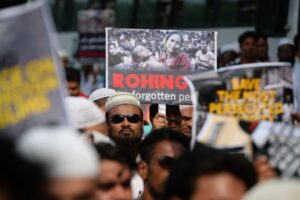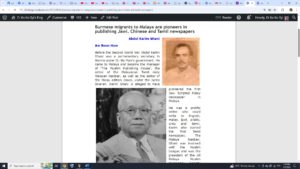PART 1. Thailand vs Myanmar: A Tale of Two Nations and Their Migrants
(Done with help from Kaung Kin Ko’s post)
MMNN Special Report | Thailand vs Myanmar: A Tale of Two Nations and Their Migrants
Why Migrants Are a Burden in One Country but a Blessing in Another
By MMNN Editorial Team | July 2025
While many governments today politicize migration as a threat or nuisance, the reality on the ground tells a different story. In a recent viral Facebook post, Myanmar public commentator Kaung Kin Ko highlighted the contrasting approaches of Myanmar and Thailand toward migrants—particularly those from Myanmar.
His reflections, which echo the lived experience of millions of Burmese migrant workers in Thailand, are both sobering and eye-opening for anyone concerned with justice, development, and dignity.
Thailand: Embracing Migrants as Contributors
Despite some bureaucratic flaws and occasional social discrimination, Thailand has shown a level of inclusiveness and pragmatism that contrasts sharply with Myanmar’s harsh citizenship policies:
- Children born in Thailand—even if their parents entered illegally—often get access to Thai public schools, where they are provided with free or subsidized education and even milk nutrition programs.
- Kaung Kin Ko notes that even children born outside of Thailand have pathways to legal residency and citizenship, something unthinkable under Myanmar’s 1982 Citizenship Law, which has been used to systematically exclude ethnic minorities.
Moreover, Thailand recognizes the economic contributions of Burmese laborers, many of whom form the backbone of its construction, hospitality, agriculture, and domestic work sectors. This “win-win” model sees migrants not as parasites, but as partners.
Myanmar: Where Being Born Isn’t Enough
In stark contrast, Myanmar’s citizenship law weaponizes ethnicity and ancestry. Kaung Kin Ko writes:
“Even those born and raised in Myanmar, with generations of ancestry in the country, struggle to gain citizenship if they’re not seen as ethnically pure or can’t afford bribes.”
Under Myanmar’s infamous 1982 Citizenship Law, the burden of proof is disproportionately placed on minorities, especially Muslims, who are often branded as “foreigners” despite having deep historical roots in the country.
He adds:
“Even if you’re born in Myanmar, unless you’re of the right blood and pay the right people, you’re not a citizen. You’re vulnerable to arbitrary arrest, detention, and denial of rights.”
This policy, rooted in Burman Buddhist nationalism (မဘသ), fosters systemic discrimination and leaves entire communities in limbo, stateless within the very country they built.
The American Paradox: A Nation of Migrants Led by Anti-Migrant Politics
If Thailand offers a pragmatic model and Myanmar a tragic one, the United States—particularly under former President Donald Trump—presents a paradox.
The U.S. is a nation built by migrants, from Irish railroad workers to Jewish refugees, Latin American laborers to African slaves. Yet Trump’s presidency was marked by calls to:
- Build a wall against Mexican migrants
- Ban Muslims from entry
- Strip children of undocumented migrants of protections (DACA)
- And most recently, threaten to deport Elon Musk, a South African-born U.S. citizen and the world’s richest man.
Imagine: If even Musk isn’t safe, what hope is there for poor, voiceless immigrants?
Trump’s anti-immigrant agenda starkly contrasts with the U.S.’s founding ideals—“Give me your tired, your poor, your huddled masses yearning to breathe free.” Instead, migrants are now branded as threats, burdens, or enemies.
Migration Is Not a Crime—It’s a Contribution
Kaung Kin Ko wisely observes that no society is perfect. Yes, Thailand has discrimination, but it’s often class-based, not always rooted in ethnicity or race. He explains how Burmese migrants, even undocumented ones, are treated with more dignity in Thailand than many minorities in their own homeland of Myanmar.
“In Myanmar, it’s about blood. In Thailand, at least it’s about conduct. If you behave, contribute, and live peacefully—you’re treated like a human.”
He calls out Myanmar’s ongoing dehumanization of ethnic minorities, contrasting it with the relative openness and Buddhist-inspired compassion of Thailand—“The Land of Smiles”, as it’s globally known.
Conclusion: Lessons for Myanmar and the World
- Thailand, for all its imperfections, shows that treating migrants with dignity helps both the host and the migrant—economically and socially.
- Myanmar must learn that denying citizenship to those born within its borders weakens the nation, breeds hatred, and fuels unrest.
- America must remember that its greatness was built not in spite of migrants, but because of them. Deporting those who disagree with the president undermines both democracy and humanity.
As Kaung Kin Ko warns, “No majority owns any minority. A true nation is not defined by blood, but by shared dignity.”
Here is Ko Kaung Kin Ko’s original post in Myanmar.
[ မြန်မာ နဲ့ ထိုင်း ]
ဒီဥပဒေ အကြောင်းတော့ အသေးစိတ် မသိပါဘူး။ဒါပေမယ့် ဗမာပြည်မှာ မွေးတဲ့သူတွေ ထိုင်းနိုင်ငံသား ဖြစ်သွားတာ ဟိုးအရင်ကတည်းက သန်းနဲ့ချီရှိနိုင်တယ်။ ခုထိလည်း ထိုင်းအစိုးရ ကျောင်းတွေမှာ ဗမာပြည်မှာ မွေးတဲ့ ကလေးငယ်တွေ အခမဲ့နီးပါး တက်ရတာတွေ၊ ကျောင်းမှာပါ အာဟာရအဖြစ် နွားနို့တိုက်တာတွေ ကြားရတုန်းပဲ။
ဒီမှာတောင် မမွေးဘဲ နိုင်ငံသားဖြစ်တယ်ဆိုတာက မြန်မာနိုင်ငံရဲ့ ၁၉၈၂ လဝက ဥပဒေနဲ့ ယှဉ်ကြည်ပေါ့။ မြန်မာက မြန်မာမှာ ဘိုးစဉ်ဘောင်ဆက် မွေးလာတောင် သွေးနှောဖြစ်တာနဲ့ ….. ပိုက်ဆံတွေ အများကြီးပုံမပေးဘဲ မှတ်ပုံတင်ရဖို့ မလွယ်။ (အရင်ခေတ်ကတည်းက မှတ်ပုံတင်ရဖို့ ပိုက်ဆံပေးရတဲ့ ပမာဏချင်းလည်း မတူသလို ရစ်တဲ့ပမာဏ တိုင်းလဝကရုံး အဆင့်ထိ သွားရတဲ့ ပမာဏတွေ မတူပါ။) ညစ်ထားလို့လည်း ရတယ်။ အမြင်ကတ်လာရင် လဝက ဥပဒေ အကြောင်းပြပြီး မတရား ဖမ်းလို့လည်းရတယ်။
ခိုးဝင်ဆို သတ်ပစ်လို့ ပြောခဲ့တဲ့ နိုင်ငံနဲ့…… မြန်မာတွေ အောက်လမ်းကနေ ထိုင်းကို ခိုးဝင်ရတာပါပဲ။ ဆက်ဆံပုံချင်း ကွာတယ်။
ဒီလိုပြောလို့ ထိုင်းမှာလည်း အကုန်မျှတပြီး အကုန်ကောင်းနေတယ်လို့ ပြောတာတော့ မဟုတ်။ Perfect ဖြစ်တဲ့ နိုင်ငံမျိုး၊ နေရာမျိုး၊ လူ့အဖွဲ့အစည်းမျိုးကတော့ မရှိ။ အတိုင်းအတာ တရပ်အထိ ကောင်းတာကို ပြောတာ။ ပြီးတော့ ကောင်းတဲ့အထဲမှာ သူတို့ အကျိုးစီးပွါး အတွက်လည်း ပါတာပဲ။ Win-win သဘောတွေပါတယ်။
ဗမာ အလုပ်သမားတွေရဲ့ လုပ်အားက သူတို့နိုင်ငံရဲ့ စီးပွားရေးကို အထောက်အကူပြုတယ်။ သူတို့မြေပေါ် ရောက်လာပြီးသား ကလေးတွေဟာ ခိုးဝင် ကလေးဖြစ်နေဦးတော့ ပညာသင်ပေးခြင်း၊ တွဲခေါ်ခြင်းအားဖြင့် ထိုင်းမြေပေါ်မှာ ပညာမတတ်မှုကြောင့် ဖြစ်လာမယ့် ဆိုးကျိုးတွေကို တားဆီးပြီးသား ဖြစ်သွားတယ်။ ပြီးတော့ မြန်မာပြည်မှာက လူတိုင်းက အလိုလို ရုန်းကန်နေရာတော့ ဒေါသထွက်၊ aggressive ဖြစ်ကြတယ်။ ဒီတော့ ရန်လိုမှ ရှင်သန်နိုင်မလို တော်ရာကျ မလိုဖြစ်တယ်။ တော်လှန်ရေးထဲက ဆယ်လီတွေကိုပဲကြည့်။ ယေဘုယျသဘော ပြောရရင် အဆဲသန်ဆုံး ရန်အတွေ့အကောင်းဆုံးသူတွေ လူကြိုက်အများဆုံး ဖြစ်တာမျိုးလည်း ရှိတယ်။ အဲဒီတချက်တည်းတော့ မဟုတ်ဘူးပေါ့လေ။ ထိုင်းတွေ ကားမောင်းရင်လည်း တော်ရုံတန်ရုံ စိတ်ရှည်တယ်။ အရက်သောက်ပြီးလည်း ရန်ဖြစ်တဲ့နှုန်း၊ ပြဿနာ ရှာတဲ့နှုန်းနည်းတယ်။ မရှိဘူး ပြောတာမဟုတ်။ လူမျိုးတိုင်းမှာ လူကောင်း လူဆိုး ရှိပြီး စရိုက်လည်း မျိုးစုံရှိမှာပဲ။ လူမျိုးတွေရဲ့ Gene တွေ အရ ကွာသွားတယ်လို့ ပြောတာလည်း မဟုတ်ဘူး။ ရှင်သန်ရတဲ့ အခြေအနေတွေကြောင့် ကွာသွားတာလို့ မြင်တယ်။
ထိုင်းမှာ မြန်မာပြည်က လူတွေအပေါ် ဖိနှိပ်မှုတွေ မရှိဘူးလားဆိုတော့ သိပ်ရှိတာပေါ့။ ဒါက လူမျိုးရေးအရ မုန်းခြင်း ဖိနှိပ်ခြင်းထက်၊ လူတန်းစားအရ ဖိနှိပ်တာမျိုး ပိုများတယ်။ ကိုယ်တွေက ကိုယ့်နိုင်ငံက ဘာအကာအကွယ်မှ မပေးဘဲ ဒီကို ပြေးလာရတယ်။ တပန်းရှုံးနေတယ်။ ရပ်တည်ရေးအတွက် သမ္မာအာဇီဝ အလုပ်ဆိုတောင် သူတို့ဥပဒေနဲ့ မညီတာမျိုး လုပ်ရတယ်။ ခိုးဝင်လာရသူတွေ ဖြစ်တဲ့ အတွက်၊ အလုပ်ဆိုလည်း သမ္မာအာဇီဝကိုတောင် ခိုးလုပ်ရသူတွေ ဖြစ်တဲ့အတွက် သူတို့ထဲက ငွေညှစ်ချင်သူတွေဟာ အလွယ်တကူ ညှစ်လို့ရတယ်။ ပြီးတော့ သူတို့မှာလည်း materialist ဆန်တဲ့ စိတ်တော့ ရှိတယ်။ ဒီတော့ ဆင်းရဲ နွမ်းပါးသူတွေကို အထင်အမြင်လည်း သေးကြတယ်။ နှိမ်ကြတယ်ပေါ့။ အဲဒါတွေလည်း လူမျိုးရေးမုန်းတီးမှု လိုပဲ ဆိုးတာပါပဲ။ အဲဒါတွေတော့ ခံနေရသေးတယ်ပေါ့။ (လူမျိုးရေးအရ မုန်းတာမျိုးကလည်း လုံးဝ မရှိဘူးတော့ မဟုတ်။ နိုင်ငံတိုင်းမှာ ဖက်ဆစ်နာဇီတွေတော့ များတယ်)။ ဒါပေမယ့် ရာခိုင်နှုန်းတွေ ဒီဂရီတွေ၊ ရန်လိုမှု အတိုင်းအတာတွေတော့ ကွာတာပေါ့။ မြန်မာမှာက သေချာ လေးလေးနက်နက် ဆန်းစစ်ကြည့်ရင် ခုချိန်ထိကို တနိုင်ငံလုံးက လူအများစုဟာ မဘသ အပြင်းစား ဆန်နေတုန်းပါပဲ။
ဒီတော့ သူတို့ဆီမှာလည်း perfect မဖြစ်သေးပေမယ့်၊ သူတို့ဆီမှာလည်း ဒုက္ခခံနေရတာ မှန်ပေမယ့်၊ သာမန်ပြည်သူ အချင်းချင်း ကြားမှာရော၊ နယ်မြေရထားသူ အုပ်စုအသီးသီး ကြားမှာရော အတုယူစရာတွေ ရှိနေပါတယ်။ ထိုင်းက The Land of Smiles လို့ နာမည်ရတာက အကြောင်းမဲ့တော့ မဟုတ်ပါဘူး။ ထိုင်းမှာ နတ်ကွန်းတွေ များတာကို အကြောင်းပြုပြီး မြန်မာပြည်က လူတွေက ထိုင်းက မြန်မာနိုင်ငံလောက်ပဲ ဗုဒ္ဓဘာသာ မစစ်သယောင် ဂုဏ်ဆာကြ၊ တဘက်ကို နှိမ်ချင်ကြသေးတယ်။ (မြန်မာမှာလည်း နတ်ကွန်းတွေ ရှိသလို၊ မဘသ ဘုန်းကြီးတွေ တအားများနေတာကကျ စစ်မှန်တာ ကျနေတာပဲ။) ဘာသာရေးကြောင့် ကောင်းလာတာတွေကို တိုင်းတာတာက နတ်ကွန်းတွေ ဘာတွေထက် လူတွေရဲ့ အပြုအမူတွေ၊ ရန်မလိုမှုတွေ၊ တခြား အုပ်စုတွေအပေါ် သဘောထားတွေ၊ ဆက်ဆံပုံတွေ နဲ့ တိုင်းတာက ပိုအဓိပ္ပါယ်ရှိတယ်။ ထိုင်းနိုင်ငံလည်း perfect မဖြစ်ပေမယ့် လက်ရှိ ကောင်းတဲ့ဂုဏ်ပုဒ်လေးတွေကို ရေရှည်ဆက်ထိန်းထားနိုင်ပါစေလို့။ တကယ်က ထိုင်းနဲ့ ဗမာက တော်တော်ရောနေပါပြီ။ အဲဒါကို မြန်မာပြည်က လူတွေဆို မဘသစိတ်နဲ့ အပြစ်မြင်ကြသူက ပိုများနေတာပါ။ (တကယ်ကတော့ အစကတည်းကလည်း မကွာတာကို ခွဲခြားနေကြလို့သာ ကွဲနေတာပါ) ကွာတာက ကြမ်းတမ်းမှု နဲ့ နူးညံ့မှုတွေ။ ရန်လိုမှု နဲ့ အပြုံးတွေ ကွာသွားတာ။
လူကို လူလို ဆက်ဆံလို့ တချို့ ethnic minority တွေကို နိုင်ငံသားပေးတာကိုတောင် minority တွေကို လူလို မဆက်ဆံတဲ့ မြန်မာနိုင်ငံက လူတွေက ထိုင်းတွေကပဲ ခိုးသွားသလိုလို ပြောကြသေးတယ်။ သိရမှာက ဘယ် minority ကိုမှ ဘယ် majority က ပိုင်နေတာမျိုး မဟုတ်ဘူး။ ပဒေါင်တွေကို ဗမာတွေက ပိုင်နေသလိုမျိုးက ဗမာ မဘသတွေပဲ တွေးတာ။ နှစ်နိုင်ငံလုံးဟာ human zoo ဆန်ဆန် လုပ်မစားဖို့တော့ လိုတာပေါ့နော်။

Appendix: Burmese Migrants and Their Contributions to Malaya and Beyond
Read full in my blog @ Burmese Myanmar Everywhere in Malaya
From colonial times to the present day, Burmese migrants have quietly but significantly contributed to the development of Malaya (now Malaysia), and elsewhere across the world. Some became pioneers, others public servants, and still others cultural bridges in their adopted homelands.
- A retired Director of CID, Malaysia, originally from British Burma, served the police in British Malaya and remained after independence.
- Tan Sri Dr. Koh Tsu Koon, former Chief Minister of Penang and Malaysian Minister, once said one of his grandparents was Burmese.
- The CEO of Habib Jewels, a major Malaysian jewelry brand, shared his Burmese roots and mentioned family members still in Yangon.
- Usha Narayanan, wife of India’s former President K. R. Narayanan, was born in Burma and earned her first degree at RASU.
- Datin Seri Tiara Jacquelina, a well-known Malaysian actress, is the granddaughter of Datuk Eddie Eu Eng Hock, a Burmese Chinese entrepreneur.
- Burmese migrants pioneered Jawi, Chinese, and Tamil newspaper publishing in Malaya.
- The mother of Malaysia’s founding Prime Minister Tunku Abdul Rahman was of Burmese Shan origin.
- Some Arab-Burmese families migrated back to the Middle East and rose to political prominence.
- Burmese migrant families owned hotels and karaoke venues in Malaysia.
- In Cambodia, descendants of Burmese who migrated during Burmese royal times were acknowledged during official state visits.
- A 100+ year-old Burmese Hindu temple in Terengganu stands as testament to early Burmese Indian railway workers.
- Many ordinary Malaysians today recall having Burmese ancestry in their family.
- Even members of Burma’s royal lineage like June Rose Bellamy (Yadana Nat Mai) became global figures.
These stories—and countless untold ones—highlight how migrant communities not only survive, but enrich their host nations. May this inspire future generations not to surrender to glass ceilings, but to crack them wide open with pride and perseverance.
To be continued in Part 2…






